 Petzlover
Petzlover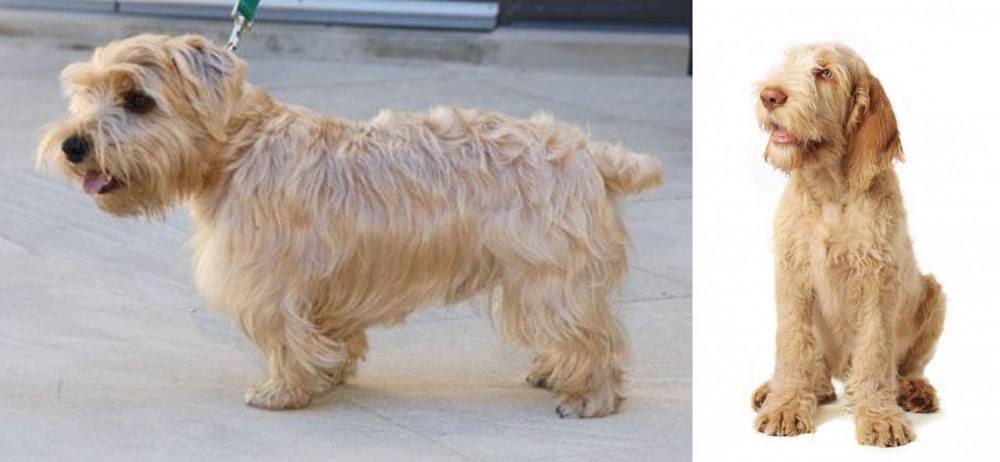 Lucas Terrier is originated from United Kingdom but Spinone Italiano is originated from Italy. Lucas Terrier may grow 40 cm / 15 inches shorter than Spinone Italiano. Lucas Terrier may weigh 30 kg / 66 pounds lesser than Spinone Italiano. Lucas Terrier may live 8 years more than Spinone Italiano. Lucas Terrier may have less litter size than Spinone Italiano. Both Lucas Terrier and Spinone Italiano requires Moderate Maintenance.
Lucas Terrier is originated from United Kingdom but Spinone Italiano is originated from Italy. Lucas Terrier may grow 40 cm / 15 inches shorter than Spinone Italiano. Lucas Terrier may weigh 30 kg / 66 pounds lesser than Spinone Italiano. Lucas Terrier may live 8 years more than Spinone Italiano. Lucas Terrier may have less litter size than Spinone Italiano. Both Lucas Terrier and Spinone Italiano requires Moderate Maintenance.
 The Lucas Terrier is a rare breed which hails from England, originating there in the late 1940s. Today it is considered a purebred. It was originally a hybrid dog, bred by crossing a Norfolk Terrier with a Sealyham Terrier.
The Lucas Terrier is a rare breed which hails from England, originating there in the late 1940s. Today it is considered a purebred. It was originally a hybrid dog, bred by crossing a Norfolk Terrier with a Sealyham Terrier.
Sir Lucas felt that the Sealyham Terrier was a bit too big for his purpose so he crossed the Sealyham with Norfolk Terriers to bring about the Lucas Terrier. The Lucas Terrier is a dog which is essentially bred for temperament and companionship and is therefore not aggressive.
The Lucas Terrier has been in the United States of America since the late 1960s and is considered a rare breed.The Lucas Terrier Club is a private, informally run organisation developed to both preserve and promote this dog breed.
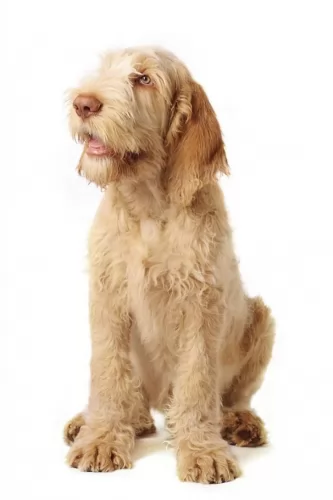 This Italian breed has an ancient blood line tracing all the back to 500 BC. Originally bred to hunt, he is today a friendly, alert and loyal companion. He is intelligent enough to do any job you give him. The Spinone is thought to be one of the oldest gun dogs ever, but it is not entirely clear that he came from Italy. There are some who think he may have come from somewhere in these European countries – Italy, Greece, France, Celtic Ireland, Spain or Russia. However, most believe the breed came from Italy in the Piedmont area.
This Italian breed has an ancient blood line tracing all the back to 500 BC. Originally bred to hunt, he is today a friendly, alert and loyal companion. He is intelligent enough to do any job you give him. The Spinone is thought to be one of the oldest gun dogs ever, but it is not entirely clear that he came from Italy. There are some who think he may have come from somewhere in these European countries – Italy, Greece, France, Celtic Ireland, Spain or Russia. However, most believe the breed came from Italy in the Piedmont area.
The most common thinking is that he is a descendent of the Spanish Pointer and/or the Russian Setter. One other theory is that setters from Greece were brought to the Roman Empire and crossed with a variety of Italian dog to make the coarse haired Spinone we see today. Then the French put in their claim that the breed is a cross of many French pointers.
The theory that counts might just belong to the Italians who believe the ancestor to the Spinone includes the German Wirehaired Pointer, the Pudelpointer and the Wirehaired Pointer. It was not until the 19th century that the name Spinone was officially given to the breed.
Before that it might have been known as a Spinoso and named after a thorn bus in Italy called the Spino. This bush was so thick and sharp that small prey animals learned to hide under it because the predators could not get through it. The Spinone however was able to fight through the briars with its thick, coarse hair and tough skin.
The breed almost became extinct during the second world war as before and after the hunters in Italy had started to use other breeds for hunting. Breeders also began to cross the Spinone with wire hairs like German Wirehaired Pointer, the Wirehaired Pointing Griffon and the Boulet.
The most popular hunting dog in Italy today is the Bracco Italiano while the Spinone is still used for hunting.
 The sweet Lucas Terrier is a small dog breed that stands at between 25 – 30cm in height and weighs anything between 5 – 9 kg.
The sweet Lucas Terrier is a small dog breed that stands at between 25 – 30cm in height and weighs anything between 5 – 9 kg.
The chest of the dog is deep and low, the nose black, the eyes dark and almond shaped, the ears medium sized and floppy. The tail is traditionally docked, giving the dog an attractive, solid, compact look to it.
If you want your Lucas Terrier to become a parent, you can expect between 3 to 5 of the cutest little puppies. Spaying and neutering are an excellent idea health-wise if you don’t want your terrier dog to have puppies.
The weather-resistant coat of the Lucas Terrier is fairly harsh and is of medium length. While most Lucas Terriers are fawnish, cream, grey or black and tan, you also get a white one.
He does great with training and socialization and is an adaptable dog too, being happy to settle into life in the city or the countryside.
This is such a sweet, amicable, jaunty little dog, good with kids and always ready for a game. With socialization and training he is ready to get on well with everyone, as well as with other dogs in the house. It is no wonder that he is becoming so popular – he just gets on with everyone, and is eager to please.
The Lucas Terrier is generally well behaved as well and being quiet, gentle and calm indoors. Because he is a Terrier, he likes to bark quite a bit, but training and socialization can help with that. Training won’t be difficult as he is intelligent.
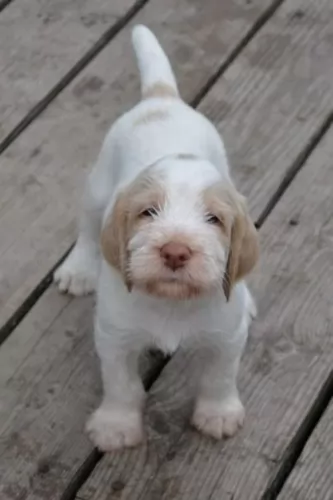 The breed is made up of strong, solid and muscled dogs that have an almost square build. His legs are made to travel any terrain and his head is long with an occipital that is pronounced and unique to the Spinone. They are said to have “human appearing eyes”, with a docked tail in countries allowing it and webbed paws.
The breed is made up of strong, solid and muscled dogs that have an almost square build. His legs are made to travel any terrain and his head is long with an occipital that is pronounced and unique to the Spinone. They are said to have “human appearing eyes”, with a docked tail in countries allowing it and webbed paws.
Shorter hair covers their feet, head, legs, muzzle and ears. They have longer hair on their eyebrows and it is stiff, with soft hair on the muzzle and cheeks with a beard and mustache. It is a single coated dog though the coat is rough. They should have skin, lips, nose, and pads in colors that coordinate with their coats. For white dog it is a red-orange color, brown in dogs that are roan colored and dark red-orange in the orange and white colored dog.
 Lively, playful, social and animated – the Lucas Terrier is such a pleasure to have around and will bring joy into your home. He is full of enthusiasm and will always be ready for a game or for a walk.
Lively, playful, social and animated – the Lucas Terrier is such a pleasure to have around and will bring joy into your home. He is full of enthusiasm and will always be ready for a game or for a walk.
They are dogs who just love being around their human family, forming close bonds with them. They’re adaptable too and slot into different situations with ease.
Gentle, calm and obedient, once you let one of these sweet dogs into your home and heart, you’ll never want to be without such a loving friend again.
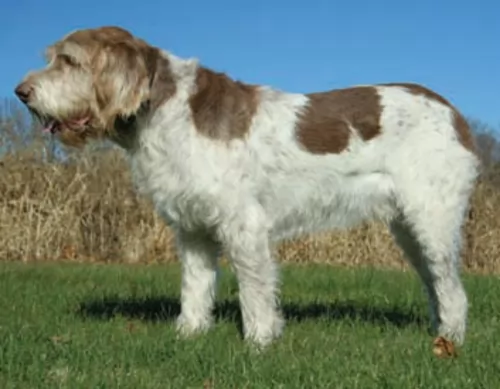 3.Adaptability – Young dogs need a lot of attention but they don’t need a lot of space. The young dogs are energetic while the adult dogs are laid-back. They need exercise every day and at least a small back yard.
3.Adaptability – Young dogs need a lot of attention but they don’t need a lot of space. The young dogs are energetic while the adult dogs are laid-back. They need exercise every day and at least a small back yard.
 Your Lucas Terrier is such a robust, jaunty, feisty little dog and with excellent care from you he may be able to push two decades. With a healthy diet and exercise, you shouldn’t have to be at the vet often with this dog.
Your Lucas Terrier is such a robust, jaunty, feisty little dog and with excellent care from you he may be able to push two decades. With a healthy diet and exercise, you shouldn’t have to be at the vet often with this dog.
There are however, always common dog illnesses that even the most healthy dog can succumb to – ear infections, eye infections, bloat, cancer, hip dysplasia and others.
Skin problems may seem mild, but they can bring a whole lot of frustration and pain to your pet. You’ve got to be careful because sometimes skin problems may be indicative of other health issues. Probably the most common cause of skin problems in dogs are allergies from parasites like fleas.
Bacterial skin infections are caused when your pet is bitten by a flea for instance and then he scratches and licks, breaking the skin and bacteria gets in, infecting the wound.
Yeast infections for instance could be found in the ear canal and around the anus. Infections like this occur in damp areas and also when other conditions are right. Yeast infections cause itchy skin with hair loss.
Skin infections are not to be taken lightly. They can bring a whole lot of discomfort to your pet and you will most certainly need to get him to the vet.
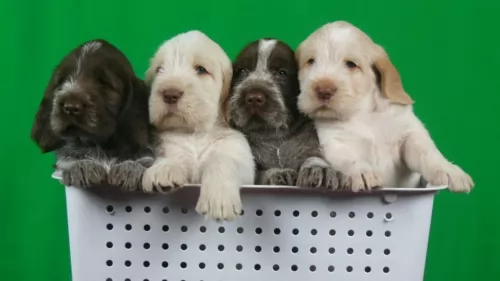 This is an ancient breed with not a lot of documented genetic issues, but it does have one deadly condition.
This is an ancient breed with not a lot of documented genetic issues, but it does have one deadly condition.
• Cerebellar ataxia (CA) is inherited and hits the puppies. Because it is a recessive gene both the mother and father must carry it for the puppy to inherit it. This makes it less likely than it would be otherwise. Puppies with the condition do not live more than a year. Since it is a genetic problem there is now a test for it that identifies carriers at a 95% accuracy rate.
• Like many other large breed dogs, they are susceptible to hip dysplasia. This can cause arthritis and/or lameness. There are now hip replacement surgeries available for this condition.
• Bloat is again common in large dogs and you need to watch for it with the Spinone. It can be deadly if not treated immediately. Let your dog rest quietly after eating. Do not let her exercise or play energetically after eating.
 This little dog isn’t a high energy dog but he will need to have a daily walk over and above the games you provide him with. Giving him a walk will be stimulating for him too as it gives him the chance to see different things and sniff around a bit.
This little dog isn’t a high energy dog but he will need to have a daily walk over and above the games you provide him with. Giving him a walk will be stimulating for him too as it gives him the chance to see different things and sniff around a bit.
The Lucas Terrier is looked upon as a low maintenance breed and a low shedder. You will need to brush him twice a week to keep the coat lustrous and to remove loose hair. Hand stripping is a method used for grooming his double coat but some people prefer to have him professionally clipped.
Feeding a dog should be a simple affair. All dog breeds appreciate a simple but nutritious diet as this avoids digestive problems.
The Lucas Terrier relies on quality food full of vitamins and minerals to ensure his health and longevity. True, commercially manufactured foods aren’t a wonderful choice, but there are some good ones and they do offer a tremendous amount of convenience.
However, you don’t just want to put a bowl of dry kibble in front of your pet night after night, so to add some tasty variety, boil chicken and brown rice or pasta along with some cooked or raw vegetables and add this to his dry kibble from time to time. It makes like a delicious kind of stew to add to the dry kibble.
You’ll see, your Lucas Terrier will have bright eyes, a wet nose and a wagging tail. He’ll thank you for sticking to a simple style of feeding that doesn’t come with unpleasant surprises to upset his stomach. Make sure he always has a bowl of fresh cool water constantly available.
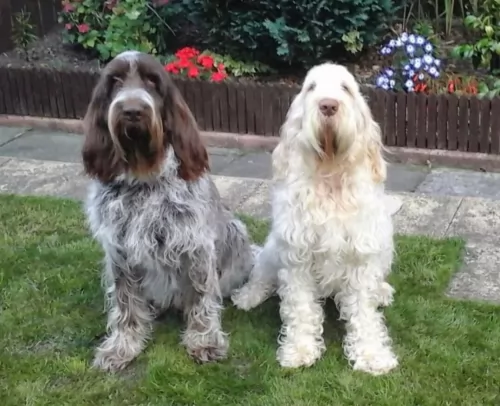 1Feeding the puppy – feed a high quality dog food for puppies of large breeds. Feed 3-4x day but don’t overfeed or let him exercise after eating even as a puppy.
1Feeding the puppy – feed a high quality dog food for puppies of large breeds. Feed 3-4x day but don’t overfeed or let him exercise after eating even as a puppy.
2.Feeding the adult - feed a high quality dog food for large breeds. Feed 1-2X day but don’t overfeed or let him exercise after eating.
4. Games and Exercises – The Spinone is an active breed, but not a fast dog. In fact, they like to travel at a trot so it becomes a great dog for jogging or running with. They love to jump, track, hunt, hike. They do well with agility, retrieving, flyball, carting, being a therapy dog, a rescue dog and a watchdog.